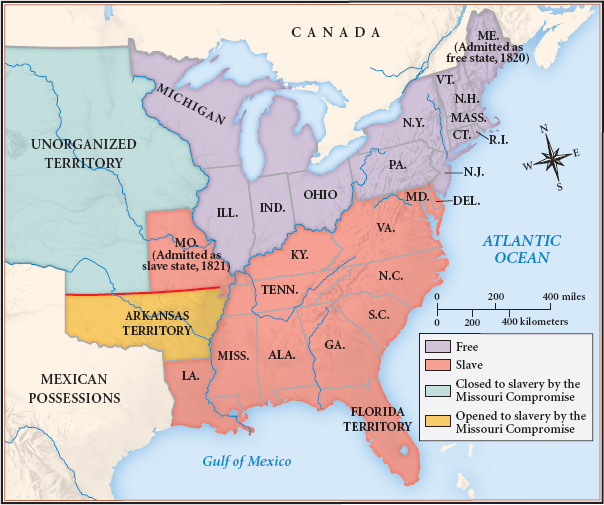The Missouri Crisis, 1819–1821
The abject failure of colonization set the stage for a major battle over slavery. In 1818, Congressman Nathaniel Macon of North Carolina warned that radical members of the “bible and peace societies” intended to place “the question of emancipation” on the national political agenda. When Missouri applied for admission to the Union in 1819, Congressman James Tallmadge of New York did so: he would support statehood for Missouri only if its constitution banned the entry of new slaves and provided for the emancipation of existing bonds-people. Missouri whites rejected Tallmadge’s proposals, and the northern majority in the House of Representatives blocked the territory’s admission.
White southerners were horrified. “It is believed by some, & feared by others,” Alabama senator John Walker reported from Washington, that Tallmadge’s amendment was “merely the entering wedge and that it points already to a total emancipation of the blacks.” Mississippi congressman Christopher Rankin accused his northern colleagues of brinksmanship: “You conduct us to an awful precipice, and hold us over it.” Underlining their commitment to slavery, southerners used their power in the Senate — where they held half the seats — to withhold statehood from Maine, which was seeking to separate itself from Massachusetts.
Constitutional Issues In the ensuing debate, southerners advanced three constitutional arguments. First, they invoked the principle of “equal rights,” arguing that Congress could not impose conditions on Missouri that it had not imposed on other territories. Second, they maintained that the Constitution guaranteed a state’s sovereignty with respect to its internal affairs and domestic institutions, such as slavery and marriage. Finally, they insisted that Congress had no authority to infringe on the property rights of individual slaveholders. Beyond those arguments, southern leaders defended human bondage. Downplaying the proposition that slavery was a “necessary evil,” they now justified slavery on religious grounds. “Christ himself gave a sanction to slavery,” declared Senator William Smith of South Carolina. “If it be offensive and sinful to own slaves,” a prominent Mississippi Methodist added, “I wish someone would just put his finger on the place in Holy Writ.”

Controversy raged in Congress and the press for two years before Henry Clay devised a series of political agreements known collectively as the Missouri Compromise. Faced with unwavering southern opposition to Tallmadge’s amendment, a group of northern congressmen deserted the antislavery coalition. They accepted a deal that allowed Maine to enter the Union as a free state in 1820 and Missouri to follow as a slave state in 1821. This bargain preserved a balance in the Senate between North and South and set a precedent for future admissions to the Union. For their part, southern senators accepted the prohibition of slavery in most of the Louisiana Purchase, all the lands north of latitude 36°30' except for the state of Missouri (Map 8.3).
As they had in the Philadelphia convention of 1787, white politicians preserved the Union by compromising over slavery. However, the delegates in Philadelphia had resolved their sectional differences in two months; it took Congress two years to work out the Missouri Compromise, which even then did not command universal support. “[B]eware,” the Richmond Enquirer protested sharply as southern representatives agreed to exclude slavery from most of the Louisiana Purchase: “What is a territorial restriction to-day becomes a state restriction tomorrow.” The fate of the western lands, enslaved blacks, and the Union itself were now intertwined, raising the specter of civil war and the end of the American republican experiment. As the aging Thomas Jefferson exclaimed during the Missouri crisis, “This momentous question, like a fire-bell in the night, awakened and filled me with terror.”
PLACE EVENTS IN CONTEXT